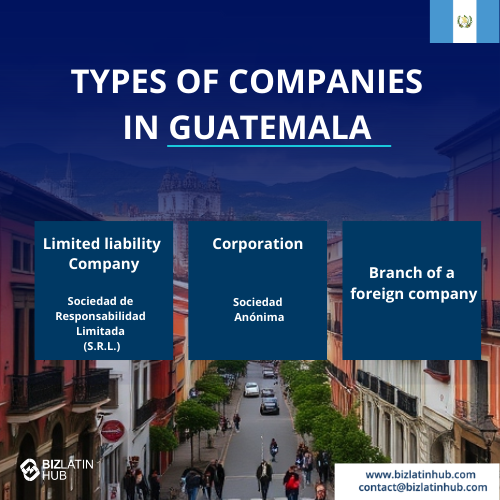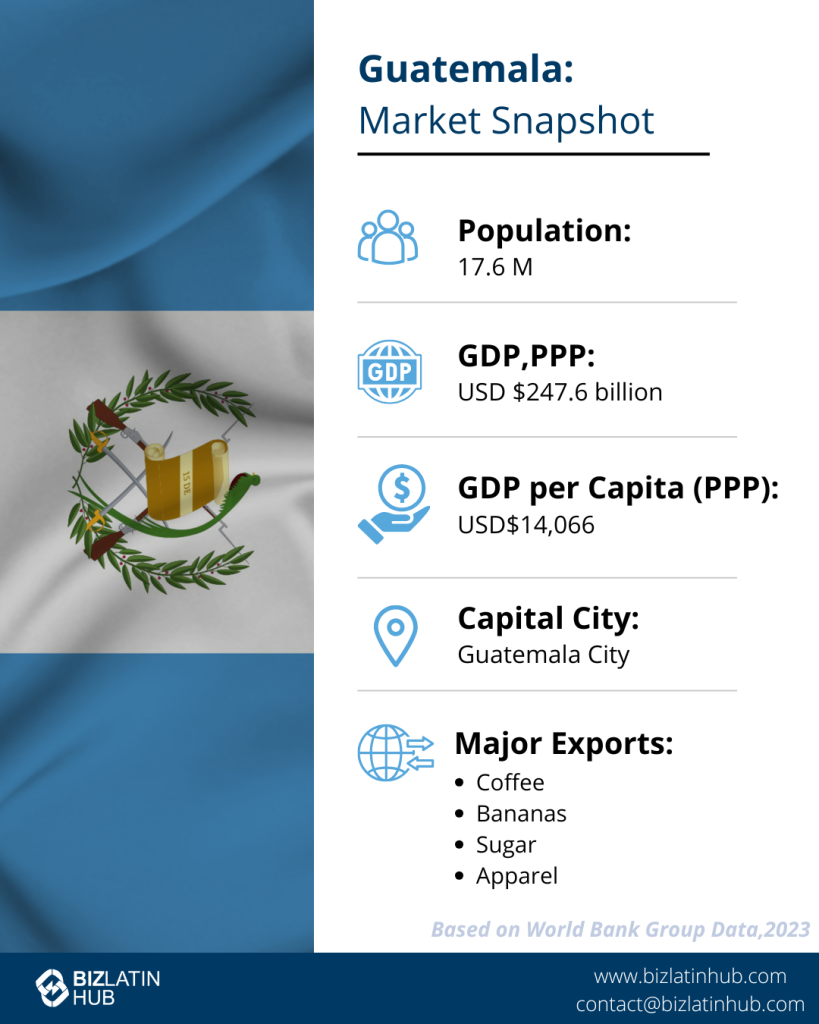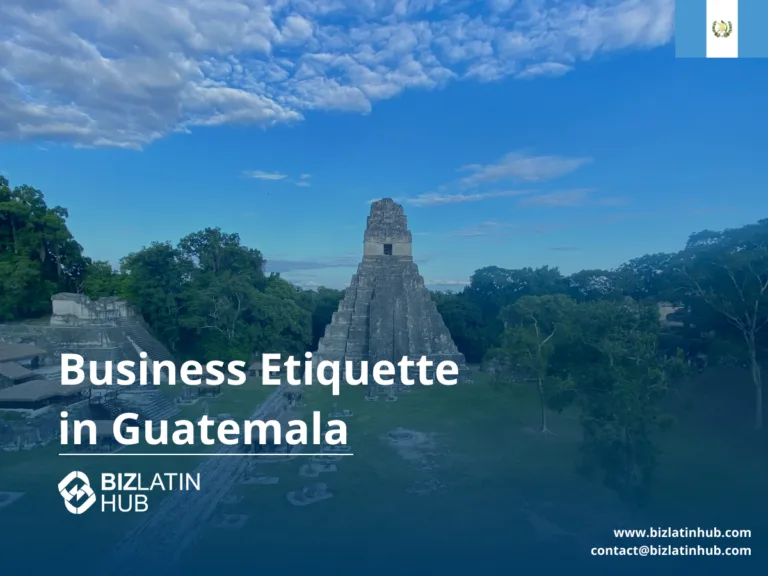Understanding Guatemala’s business etiquette could increase the possibilities of success when you register a business in the country. Like all countries and societies, there are some cultural peculiarities connected to how trade happens. Knowing what to do and how to act will help lead you to success. There are plenty of reasons to engage with Guatemala’s business etiquette. The economy is projected to continue growing above regional averages throughout 2025.
Key takeaways on Guatemala’s business etiquette
| How important is relationship building in Guatemala’s business etiquette? | A great deal of importance is placed on building personal relationships for high-context communication. |
| Is remote working popular in Guatemala’s business culture? | It is certainly popular among workers, if not quite so much with employers. Especially in the tech field, it is becoming more and more common, with many employees citing it as important. |
| Does punctuality matter in Guatemala’s business culture? | Ignore the stereotypes and make sure you do things on time to make a good impression. |
| How formal is Guatemala’s business culture? | Make sure you remain respectful of social status and conduct yourself in a formal and professional manner. |
| Do you need to speak Spanish to do business in Guatemala? | Clear communication in English and Spanish will help both with business matters and with building those personal relationships. |
Hierarchy in Guatemala’s business etiquette
Hierarchy in Guatemala has great importance. Not understanding this could lead to negative consequences. To avoid this, it is essential to remain formal and use honorifics wherever possible.
In some Western countries, expressing opinions and contradicting decisions shows independence, courage, and initiative. However, this behavior in Guatemala could be seen as rude and disrespectful.
Language counts
Spanish is the language of Guatemala, which means you should make an effort to learn at least some pleasantries. It will show respect and a willingness to engage with Guatemala’s business etiquette and culture. After all, you are choosing to invest in the country and this will show you are serious.
You don’t necessarily have to speak the language fluently or even haltingly, as translators and interpreters can be on hand to help out if needed. Bilingualism is common among professionals, whether that’s your team of lawyers and financial advisors or the other team across the negotiating table.
High context communication in Guatemala
In Guatemala’s business etiquette, high context communication is common. This means that people need a significant amount of contextual information about individuals before they can establish private or business relationships. Therefore, business is generally conducted through personal relationships.

Furthermore, Guatemalans convey information not only through words but also through the voice, body language, facial expression, eye contact, speech patterns, and use of pauses in speaking. Likewise, people in Guatemala rely on references to previous encounters, status, and mutual friends.
There are also some significant aspects you may want to consider:
- Heavy use of non-verbal signals.
- Indirect communication is seen as an art form.
- Conflicts must be resolved before work can begin.
- Business relationships are based on trust and develop slowly.
- Your own identity is rather rooted in the group.
- Thinking patterns are more holistic and deductive.
- There are a few fixed rules.
- Information is mainly acquired through informal networks.
Punctuality
Despite a common stereotype of lateness and poor timekeeping in Guatemala (and Central America in general), this will not apply to business environments. While it might be quite frequent to see people arriving late to casual engagements, professionals are held to a very different standard. On top of that, foreign businesspeople will be expected to be punctual, so make sure you live up to expectations.

FAQs on Guatemala’s business etiquette
These are some of the most common questions we receive from international investors interested in Guatemala’s business etiquette.
1. Can a foreigner own a business in Guatemala?
Yes, by either legal persons (legal entities) or natural persons (individuals).
2. Why do business in Guatemala?
Guatemala is the largest economy in Central America, and among the top ten economies in Latin America, with a GDP (PPP) that hit $247 billion in 2023 (all figures in USD).
The country’s strong economic performance over recent years has made it an increasingly attractive destination for foreign direct investment (FDI). FDI has continued to grow, consistently making up a significant portion of GDP. Over the past two decades, FDI has represented between 1.3% and 2.9% of GDP.
3. How long does it take to register a company in Guatemala?
lt takes between 8 to 10 weeks to form a company in Guatemala after all required information and documentation have been provided.
4. What does an S.R.L company name mean in Guatemala?
With a limited liability company or LLC (known locally as a Sociedad de Responsabilidad Limitada or S.R.L.), participation is not measured in shares, but in contributions from partners, with each partner’s liability limited to the capital they have contributed to the company. Partners are not personally liable for the debts that the company may face.
Other requirements to register an LLC in Guatemala are:
- A minimum of two (2) and a maximum of 20 partners are allowed, and they can be individuals or legal entities.
- The company must have an original name to trade under, which by law must also include the words ‘limited company’ (which may be abbreviated).
- The company cannot have an industrial partner (article 82 of the Commercial Code).
Small companies often choose to incorporate as an LLC. However, another option for small and big companies alike is a corporation.
5. What does an S.A. company name mean in Guatemala?
In Guatemala, “SA” stands for “Sociedad Anónima,” which is similar to a joint-stock company.
6. What entity types offer Limited Liability in Guatemala?
The S.R.L offers liability limited to your capital contribution.
Why register a company in Guatemala?

Guatemala is the largest economy in Central America, and among the top ten economies in Latin America, with a GDP (PPP) that hit $247 billion in 2023 (all figures in USD).
The country’s strong economic performance over recent years has made it an increasingly attractive destination for foreign direct investment (FDI). FDI has continued to grow, consistently making up a significant portion of GDP. Over the past two decades, FDI has represented between 1.3% and 2.9% of GDP.
One of the reasons for Guatemala’s success in attracting investment is the government’s success in reducing its once notoriously high levels of violence – with intentional homicides more than halving since 2009.
The country also benefits from its highly strategic location. By dominating Mexico’s southern border, Guatemala forms a gateway between the three major economies of North America and the rest of Central America.
Guatemala has high-volume ports serving both the Pacific Ocean and the Caribbean Sea, offering easy freight access to the rest of the Americas, as well as Asia-Pacific and Europe.
Guatemala has a famously large agricultural sector, which generates almost 10% of GDP. Coffee, bananas, and sugar are some of the key agricultural exports. Manufacturing is even more important. With a massive garment producing industry at its center, it contributes 22% of the GDP. The country’s fast-growing sector is services, and it is responsible for 60% of GDP.
Understanding Guatemala’s business etiquette can become an important part of the long-term success of your business operations. However, we recommend getting support from experts to professionalize your business operations according to Guatemala’s business etiquette standards.
Biz Latin Hub has an international and multilingual team, operating in more than 16 countries in Latin America and the South Pacific. Our expert lawyers and accountants provide tailor-made solutions in market entry and back-office support.
Our vast experience and wide range of backup services ensure quality work when supporting you with legal services, visa procedures, PEO, recruitment and hiring, payroll management, accounting and taxations, and others. Contact us now to receive personalized assistance.
Learn more about our team and expert authors.






